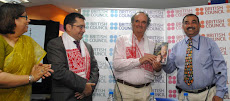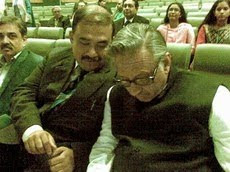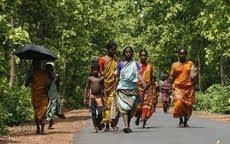There are three superpowers now. The US is one. It is a military power with hegemonic designs, it wants to control the world and make it dance to its tune. The US is a settler state, aggresive and domineering, with a cowboy culture dominating its foreign policy - the only difference being B-52 bombers and Cruise missiles have replaced six-shooter pistols we see in gunfights in Western films. The second major power now is China - a power, a mix of an ancient Oriental empire and a modern mercantilist power, that would not hesistate to use force in areas around it to enforce control but is generally more inclined to use its growing economic clout to promote its influence by huge aid packages and trade based on cheap goods. But the Chinese have enough population and wont hesistate to effect substantial transfer of its own population (as they have done in Siberia, Burma and Central Asia) to create "Little Chinas" that would serve the cause of furthering Chinese domination.
The second major power now is China - a power, a mix of an ancient Oriental empire and a modern mercantilist power, that would not hesistate to use force in areas around it to enforce control but is generally more inclined to use its growing economic clout to promote its influence by huge aid packages and trade based on cheap goods. But the Chinese have enough population and wont hesistate to effect substantial transfer of its own population (as they have done in Siberia, Burma and Central Asia) to create "Little Chinas" that would serve the cause of furthering Chinese domination. The third global power is an unique trans-national state - the European Union. With 27 member states and with a long list of countries waiting to become members, the European Union today is an empire bigger than the Roman Empire or the Macedonian empire ever was. But it is an empire that's grown by consensus - an union of nations who want to live together, even forgetting (like in the case of France and Germany) their long history of war and conflict. This is an empire based on the shared values of European civilisation, a global power that is essentially civilian in nature and perhaps with no apparent military ambitions. Now, there are those who would like to believe India can be a global power. I dont think that's possible. India has population, a growing economy, a strong military but it will always be a "swing state", one that can swing the balance in a region like South Asia. So all big powers like the US will try to cultivate India and befriend it. The main reason is India is bogged down by huge internal conflicts, ethnic and caste and class conflicts et al with the Maoist upsurge threatening to bog down huge resources and attention. Unless India can resolve these conflicts that grows out of its diversity, we will never be a big power. We could have been if we developed an union by consensus - like the European Union. As Netaji Subhas Bose had said, India should develop as a genuine union of republics. But India chose the model of a centralised British state, so we got a federation with a strong unitary bias.
The third global power is an unique trans-national state - the European Union. With 27 member states and with a long list of countries waiting to become members, the European Union today is an empire bigger than the Roman Empire or the Macedonian empire ever was. But it is an empire that's grown by consensus - an union of nations who want to live together, even forgetting (like in the case of France and Germany) their long history of war and conflict. This is an empire based on the shared values of European civilisation, a global power that is essentially civilian in nature and perhaps with no apparent military ambitions. Now, there are those who would like to believe India can be a global power. I dont think that's possible. India has population, a growing economy, a strong military but it will always be a "swing state", one that can swing the balance in a region like South Asia. So all big powers like the US will try to cultivate India and befriend it. The main reason is India is bogged down by huge internal conflicts, ethnic and caste and class conflicts et al with the Maoist upsurge threatening to bog down huge resources and attention. Unless India can resolve these conflicts that grows out of its diversity, we will never be a big power. We could have been if we developed an union by consensus - like the European Union. As Netaji Subhas Bose had said, India should develop as a genuine union of republics. But India chose the model of a centralised British state, so we got a federation with a strong unitary bias.
 Our founding fathers, specially people like Patel, felt a strong Centre will make us stronger - the reverse happened. India like Europe is a civilisation state, it can never be a nation state. The history of centralised empires in India goes to no more than 700 to 800 years - even if you put together the Guptas and Maurayas, the Delhi Sultanate and the Mughals and the British. The rest of our history is the history of the regions. Multiplicity of identity is a fact of Indian life. Netaji Subhas was no less a patriot than the Patels, Nehrus and Rajendra Prasads. But when he had a better sense of Indian history than his former colleagues in the Congress. So he boldly promoted his "union of genuine republics". But you say that now and you are seen as anti-national. When we say unity in diversity, the emphasis is on unity. That's not a problem but if you are a confident union - like the European Union - you will be less than worried about unity. After sixty-two years, we are still worried about "threats to national unity" because we failed to promote a sense of shared destiny. Unions like India and Europe survive on shared civilisation values, common markets and a sense of shared destiny.
Our founding fathers, specially people like Patel, felt a strong Centre will make us stronger - the reverse happened. India like Europe is a civilisation state, it can never be a nation state. The history of centralised empires in India goes to no more than 700 to 800 years - even if you put together the Guptas and Maurayas, the Delhi Sultanate and the Mughals and the British. The rest of our history is the history of the regions. Multiplicity of identity is a fact of Indian life. Netaji Subhas was no less a patriot than the Patels, Nehrus and Rajendra Prasads. But when he had a better sense of Indian history than his former colleagues in the Congress. So he boldly promoted his "union of genuine republics". But you say that now and you are seen as anti-national. When we say unity in diversity, the emphasis is on unity. That's not a problem but if you are a confident union - like the European Union - you will be less than worried about unity. After sixty-two years, we are still worried about "threats to national unity" because we failed to promote a sense of shared destiny. Unions like India and Europe survive on shared civilisation values, common markets and a sense of shared destiny.  They can not be held together by armies and para-military troops. India can increase its influence its power and influence by choosing the right ally and a right model. We cannot trust China and the US because both are expansionist and would not hesistate to use military force and other forms of power against us. As they say, if US is your friend, you really dont need an enemy. And China. Look at the way Chinese timber traders are raping the forest wealth of Siberia, look at the way it is transporting Chinese populations to Central Asia and Burma to make them client states and look at what it has done in Tibet and you can be sure we have no good reason to trust China. We have to deal with them, as we have to deal with the US but we can't trust either. That leaves us with Europe. My good friend, the geopolitical thinker Parag Khanna says in his great book "The Second World" that as a swing state, India must choose to befriend a major power to emerge stronger and more influential on the global scene. The European Union is our long term ally of choice. But India has this huge problem of looking at Europe through Britain and Britain is in the European Union but not quite in it. It has still not accepted the Euro and it wants tro retain its national identity and it is behaving like a surrogate of the US. India will not only have to look closely at the European model to create a new kind of union, so that we can handle the separatist tendencies and other internal conflicts - India will have to befriend the European Union as its ally of choice in the global arena in years to come.
They can not be held together by armies and para-military troops. India can increase its influence its power and influence by choosing the right ally and a right model. We cannot trust China and the US because both are expansionist and would not hesistate to use military force and other forms of power against us. As they say, if US is your friend, you really dont need an enemy. And China. Look at the way Chinese timber traders are raping the forest wealth of Siberia, look at the way it is transporting Chinese populations to Central Asia and Burma to make them client states and look at what it has done in Tibet and you can be sure we have no good reason to trust China. We have to deal with them, as we have to deal with the US but we can't trust either. That leaves us with Europe. My good friend, the geopolitical thinker Parag Khanna says in his great book "The Second World" that as a swing state, India must choose to befriend a major power to emerge stronger and more influential on the global scene. The European Union is our long term ally of choice. But India has this huge problem of looking at Europe through Britain and Britain is in the European Union but not quite in it. It has still not accepted the Euro and it wants tro retain its national identity and it is behaving like a surrogate of the US. India will not only have to look closely at the European model to create a new kind of union, so that we can handle the separatist tendencies and other internal conflicts - India will have to befriend the European Union as its ally of choice in the global arena in years to come.
Friday, September 4, 2009
India Should Look To European Union, Not US
။ Photos : National Archives of India, AP and Ju Peng (Xinhua)
( Subir Bhaumik is the BBC's East India Correspondent and a known strategic relation observer )







